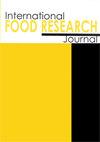Fermented vegetables and fruits as vitamin B12 sources: An overview
IF 1
4区 农林科学
Q4 FOOD SCIENCE & TECHNOLOGY
引用次数: 0
Abstract
There is a trend towards the consumption of plant foods, especially from the public that aims to reduce meat consumption. Plant-based food diets may have low source of vitamin B12 as plants do not produce them. A possible alternative to mitigate this is the consumption of fermented vegetables and fruits. Therefore, we aimed to provide an overview of the work being done with fermented vegetables and fruits, and show evidence that it is possible to obtain the necessary daily amount of vitamin B12 for human health and maintenance. Vitamin B12, also known as cobalamin, acts as a cofactor for the enzyme methionine synthase and methylmalonylCoA mutase in eukaryotes. The dietary reference values for adult men and women range between 2 and 4 μg/day; however, the requirement may increase depending on special recommendations. The main causes for vitamin B12 deficiency are autoimmune conditions (e.g., pernicious anaemia), malabsorption, and dietary insufficiency. One of the commonly adopted measures to deal with vitamin deficiency is supplementation. It is also possible to obtain food enriched with vitamin B12 through fermentation. Different plant materials and microorganisms can be used to produce fermented products and enhance traditional products, such as tempeh, to increase vitamin B12 concentration in the final product. The bioaccessibility and bioavailability of vitamin B12 in fermented vegetables and fruits are important factors to be considered, and demand more studies. The intake of soy fermented foods, such as tempeh, tofu, and cheonggukjang was associated with cognitive enhancement and neuroprotective effects. In addition to fermented vegetables and fruits, other non-animal sources of vitamin B12 that deserve great attention are algae and mushrooms. Since fermentation can produce considerable amounts of vitamin B12, fermented vegetables and fruits are feasible alternative sources for the intake of this vitamin.作为维生素B12来源的发酵蔬菜和水果:综述
现在有一种食用植物性食品的趋势,尤其是来自公众的,旨在减少肉类消费的趋势。植物性食物的维生素B12含量可能较低,因为植物不产生维生素B12。一种可能的替代方法是食用发酵蔬菜和水果。因此,我们的目的是概述发酵蔬菜和水果所做的工作,并展示证据,证明有可能获得人体健康和维持所需的每日维生素B12量。维生素B12,也被称为钴胺素,在真核生物中作为蛋氨酸合成酶和甲基丙二酰辅酶a变化酶的辅助因子。成年男性和女性的饮食参考值在2至4微克/天之间;但是,根据特殊建议,要求可能会增加。维生素B12缺乏的主要原因是自身免疫性疾病(如恶性贫血)、吸收不良和饮食不足。对付维生素缺乏症的常用措施之一是补充维生素。通过发酵也可以获得富含维生素B12的食物。可以使用不同的植物材料和微生物来生产发酵产品,并增强传统产品,如豆豉,以增加最终产品中的维生素B12浓度。发酵蔬菜和水果中维生素B12的生物可及性和生物利用度是需要进一步研究的重要因素。摄入豆豉、豆腐和清果酱等大豆发酵食品与认知增强和神经保护作用有关。除了发酵的蔬菜和水果,其他值得注意的非动物来源的维生素B12是藻类和蘑菇。由于发酵可以产生相当数量的维生素B12,发酵蔬菜和水果是摄入这种维生素的可行替代来源。
本文章由计算机程序翻译,如有差异,请以英文原文为准。
求助全文
约1分钟内获得全文
求助全文
来源期刊

international food research journal
Agricultural and Biological Sciences-Food Science
CiteScore
1.40
自引率
0.00%
发文量
75
期刊介绍:
The International Food Research Journal (IFRJ) publishes papers in English, six (6) issues a year with the coverage of:
Food Science and Technology
Nutrition and Dietetics
Agriculture, multidisciplinary
Chemistry, multidisciplinary
The scope of the Journal includes:
Food Science, Food Technology and Food Biotechnology
Product Development and Sensory Evaluation
Food Habits, Nutrition, and Health
Food Safety and Quality
Food Chemistry, Food Microbiology, Food Analysis and Testing
Food Engineering
Food Packaging
Food Waste Management
Food Entrepreneur
Food Regulatory
Post-Harvest Food Management
Food Supply Chain Management
Halal Food and Management
 求助内容:
求助内容: 应助结果提醒方式:
应助结果提醒方式:


